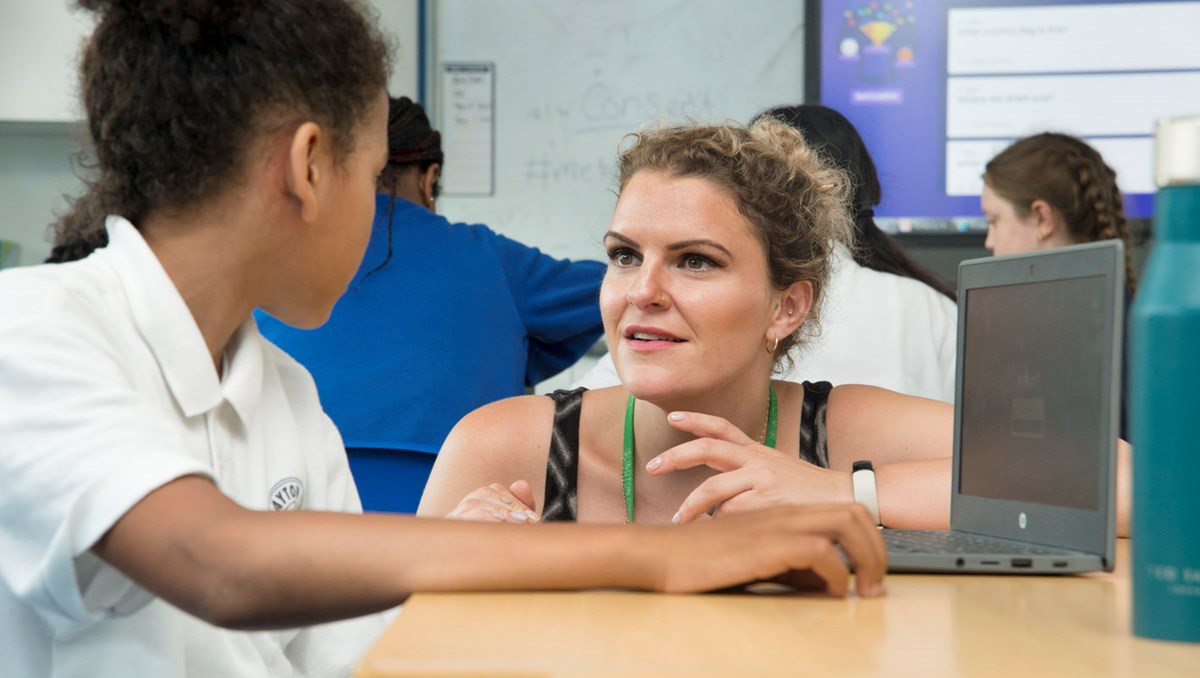Our new report examines the expanding responsibilities of teachers in modern education
Our new report, 'Teaching: the new reality', sheds light on the critical role of teachers and their expanding responsibilities in modern education.
News 10 May 2023 / 4 mins read

Our latest report, Teaching: the new reality, sheds light on the critical role of teachers and their expanding responsibilities in modern education.
Our research, carried out in conjunction with YouGov, shows that as the roles of teachers and education staff expand, the added responsibilities affect their mental health and wellbeing, which ultimately has an impact on children and young people’s education.
Working in schools and colleges has evolved since 2020 to include a range of emotional and pastoral responsibilities, as well as support for those who are vulnerable. Over six in ten staff (62%) reported offering increased amounts of emotional support to pupils or students since the start of the COVID-19 pandemic, with the same amount (62%) reporting that pupil and student behaviour takes up more time. Half (50%) reported being more likely to be supporting other staff members and colleagues with their emotional wellbeing. Almost half (48%) reported increased pastoral duties to support the welfare of pupils. Over four in ten (45%) offer more support to vulnerable pupils and their families.
This occurs in the wider context of a cost of living crisis and rising mental health challenges among children and young people. While teachers and education staff are rising to the new challenges, a significant number report feeling under prepared to take on these new and increasing responsibilities. Among those taking on more responsibilities:
32%
said they were not prepared for dealing with difficult pupil/student behaviour
34%
said they were not prepared for offering emotional support for staff/colleagues
39%
said they were not prepared for supporting vulnerable pupils and their families
In the report, of those who have taken on additional activities, 81% of senior leaders and 70% of school teachers stated their mental health and wellbeing were negatively impacted by additional responsibilities. This is leaving 83% of all senior leaders, 70% of all school teachers describing themselves as somewhat or very emotionally exhausted.
Of those taking on extra responsibilities, one quarter now work an additional 4-6 hours per week, and an additional 15% taking on an additional 7-10 hours.
We also asked how teachers and education staff work with public bodies (such as social services, CAMHS and the NHS) that are also stretched and struggling to provide vital support for children and young people. Our report shows that ofthose who said they have been working with these services more, 65% of school teachers and 71% of senior leaders feel little or no support is offered to their pupils by these bodies.
Our findings paint a picture of an education system – and wider public services – that are struggling to meet the level of need required by children and young people, and therefore limiting their life chances. The research is supported by a collection of first-hand accounts from a range of school staff who share their experiences and the challenges they face in the current educational landscape.
This report is a call to action but also offers recommendations for Government and policymakers that can benefit the education system and future generations of children and young people. By elevating the discussion surrounding teacher wellbeing and wider children’s services, we hope to inspire meaningful change and contribute to a brighter future for all involved in the education system.
This is a brilliant and exceptionally timely report which clearly identifies the profound change that has taken place in the role of the teacher over the past decade and its impact on individuals as well as the profession.Peter Fonagy, Chief Executive, Anna Freud National Centre for Children and Families
Sinéad Mc Brearty, Chief Executive of Education Support commented: “The work of teachers and education staff has changed dramatically since 2020. It has expanded beyond traditional pastoral care to include a huge range of support for children and young people who cannot access help through overwhelmed health or social care services.
Policymakers need to catch up with this new reality. The job that teachers are currently trained for does not match the daily reality of providing emotional and mental health support, resolving family conflict and providing food and clothes. If we continue in this way, we will burnout a generation of talented and dedicated staff. Future generations of children and young people will be even worse hit as the teacher retention and recruitment challenges worsen.”
Janet Smith*, Pupil Premium Intervention Teacher in primary, who recently retired after 32-years in education says: “The job of teaching is completely different to when I started my career. The stress and emotional toll of constant worry and care is huge. It’s hard to switch off from that. It’s not just me. I have known class teachers to personally provide food and clothes for pupils. And, of course, the kids pick up on all of the pressure we’re under… I can’t begin to imagine the drudgery of education that kids experience now. I used to be energised and inspiring, I couldn’t be that now.”
Professor Peter Fonagy, Chief Executive, Anna Freud National Centre for Children and Families says: “This is a brilliant and exceptionally timely report which clearly identifies the profound change that has taken place in the role of the teacher over the past decade and its impact on individuals as well as the profession. It identifies not just the impact of these changes, but also the consequences for the system and its primary beneficiaries: the children and young people. It is the best insight that we currently have on what it is like to be a teacher in the first quarter of the 21st century. It makes for hard reading for those of us closely involved in the lives of schools and the mental health of children and families.
This report will draw policy makers and, one can hope, wider society’s attention to what needs to be done to improve the wellbeing of teachers to support them in this essential role. I think all of us involved with children and young people are grateful to Education Support for providing the essential facts needed to target our efforts.”
Amy Dicks, Policy and Impact Manager at The Children's Society commented:
"Since Covid, the number of children struggling with their emotional and mental health, and behavioural issues continues to grow against a depressing backdrop of children’s services, such as CAMHS, reaching breaking point. As this report rightly points out, teachers are increasingly being asked to support pupils with complex needs and require much more help and training to spot the warning signs when children are struggling in schools, especially to avoid this being misjudged as bad behaviour.”
"The Government needs to put the wellbeing of children at the heart of policy making and commit to proper funding of mental health support teams so they can be urgently rolled out to all schools.”
Lynn Perry MBE, CEO of Barnardo’s says:
“In recent years, children’s mental health has reached crisis point, as a result of the ongoing impact of the Covid pandemic and the spike in living costs. That’s why Barnardo’s is calling for the introduction of Mental Health Support Teams (MHSTs) across all schools and colleges in England. MHSTs provide mental health support as soon as it’s needed whilst helping school staff to feel confident when teaching about mental health as well as identifying children and young people who would benefit from such support.”
“Through our own work in schools, Barnardo’s understands just how much difference MHSTs can make: knowing that there are mental health professionals on hand to provide dedicated support which frees them up to focus on giving children the best chance for a brighter future.”
Paul Whiteman, general secretary of school leaders’ union NAHT, says:
“There is no doubt that the role of teachers and school leaders has expanded significantly over recent years, at a time when the resources available to them have been dwindling. As a result of cuts to vital support services, school leaders and their staff increasingly end up acting as teachers, social workers and counsellors rolled into one, as they struggle to help families access stretched, under-funded provision like CAMHS. Due to the lack of specialist support available, school staff are too often left feeling helpless, drained and overworked, which in turn only serves the fuel the recruitment and retention crisis in education.”
“We cannot continue to expect school staff to step in and fill the gaps created by the chronic underfunding of these vital services. Nor can we continue to ask them to sacrifice their own wellbeing in order to sustain the current system. As this report clearly shows, to do so would not only be unfair on them, it would be unfair on pupils too.”
Dame Alison Peacock, CEO of the Chartered College of Teaching commented:
“This report is stark reminder that schools are not 'back to normal' after the pandemic. They are having to support the mental health and wellbeing of pupils and staff, provide material support to children and families, and manage a range of complex social needs, before they can begin to address education needs. If teachers are to provide the 'world-class' education which this government aspires to, and which our children and young people deserve, then as this report makes clear, they must be able to focus on teaching. Until the broader needs of pupils and their families are addressed, and more resources made available for schools and other services, the workload and stress of education staff will continue to increase, along with the recruitment and retention crisis.”
“The kinds of high quality professional development available through government-funded programmes like NPQs and via organisations like the Chartered College of Teaching provide an effective means to increase teachers' knowledge and skills in supporting pupils' needs, but this can only be a sticking plaster unless the fundamental issues in schools are addressed.”
Education Support makes the following recommendations to UK education departments:
- It’s time to decide whether schools are the front line of children’s services, or whether they are specialists in education. If we cannot provide this level of clarity, we should plan for increased attrition from the profession and even lower recruitment into ITT.
- There must be well resourced services for children and families.
- Retention strategies need to be revisited in light of the new reality set out in this report and the attrition rate in the sector.
- Training frameworks should be updated to reflect the new reality of life in school.
- Schools in the least well-resourced areas of the four nations experience these issues more intensely than elsewhere.
- Policymakers need to listen closely to teachers and leaders currently working in ordinary (not extraordinary) schools, to ensure that policies are grounded in reality.
To download a full copy of the report, including conclusions and recommendations visit Teaching: the new reality.
NOTES ON THE RESEARCH
All figures in this press release are from YouGov Plc. Total sample size was 3082 adults. Fieldwork was undertaken between 21st June and 29th July 2022. The survey was carried out online. The figures have been weighted and are representative of all UK education staff. The report includes data from a range of sources. This includes data from research carried out in conjunction with Public First, which was released to media in December 2022. This data is not included in this release and is clearly marked in the report.
*Pseudonym used to protect teacher’s identity


















